In the month of gigs, three audiophiles recall their introduction to Bombay's early jazz-pop-rock scene
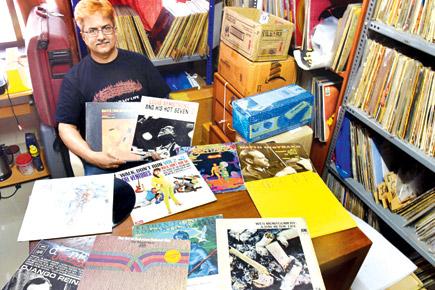
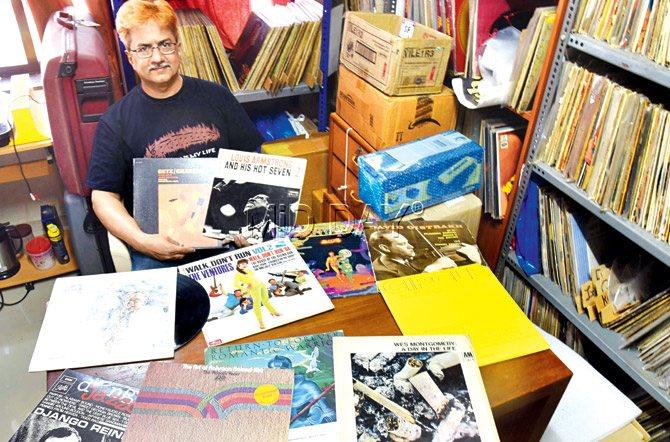
Records dealer Pilak Bhatt at his Kandivli warehouse, with some favourites from his collection. In the absence of iconic music stores in the city today, sources like him importantly keep the LP form alive. Pic/Nimesh Dave
ADVERTISEMENT
 Remember Bombay Meri Hai? As a kid I laughed hearing it rehearsed in our living room. HMV's 1969 chartbuster was composed by Mina Kava (Minoo Kavarana) to his wife Naju's lyrics. Friends of my parents, the Kavaranas were testing the bass and bounce of that peppy city ditty, which went on to become a template for future Indo-pop.
Remember Bombay Meri Hai? As a kid I laughed hearing it rehearsed in our living room. HMV's 1969 chartbuster was composed by Mina Kava (Minoo Kavarana) to his wife Naju's lyrics. Friends of my parents, the Kavaranas were testing the bass and bounce of that peppy city ditty, which went on to become a template for future Indo-pop.
What music was Bom Bom Bom Bom Bombay of that vintage weaned on? Whose tunes did it unstoppably listen and dance to? How did fans fix on sassy jazz-pop-rock emerging, in that order, to sex up the city from Sinatra to Santana?
I ask a music seller, critic and archivist — all in their fifties — to fill me in. Walking into Pilak Bhatt's warehouse at Kandivli you'll wish you had a few more heads. Mine swims within seconds, dizzy-dazed by the stunning range of records crammed sleeve to sleeve. Bhatt has built his Music Circle collection since he was 12, with gems dating to a
Gauhar Jaan record from 1904. He treasures trivia on Bombay beats with an excitement matching the line 'Music is my life' on his T-shirt. The dealer who can cough up absolutely any request, rock to ragas, struggles to store over 1 lakh LPs. These vinyl babies nest tight in special racks and ceiling-high cabinets, some to be displayed at the upcoming Mahindra Blues fest.
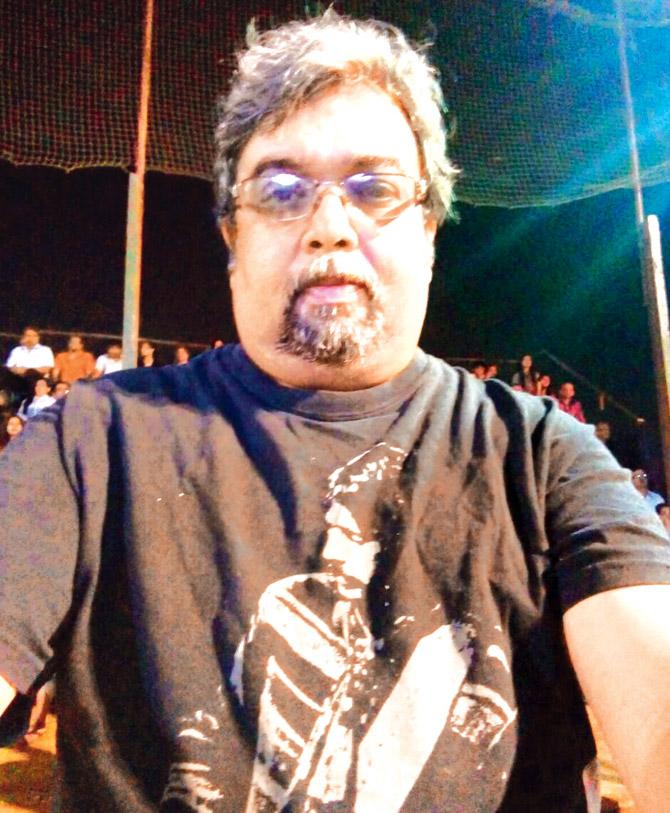
Music writer Narendra Kusnur at the Eric Clapton tribute by Mike Hall at Willingdon Catholic Gymkhana, Santa Cruz, in January 2016
Real aficionados prefer vinyl for its analog sound and natural feel, says veteran music journalist Narendra Kusnur. The moderator of Bombay's first underground rock club, from 2002, he says, "LPs were available here from the 1970s (especially once the mid-70s kicked off disco mania with the Bee Gees, Donna Summer, Cerrone, Lipps Inc). Listeners shuffled between pop and rock, depending on radio to discover new music."
Media consultant Parag Kamani archives with authority enough to have notched privy moments with touring A-list musicians. At an op with Queen's manager Jim Beach, the usual fan noises cut no ice with the tough-talking Englishman. Till Kamani let drop that every Queen album opened with a song by guitarist Brian May — which only changed with A Night at the Opera featuring Freddie Mercury as vocalist. "That was it!" Kamani exclaims. Beach and his family remain in touch with him.
Kusnur was spellbound at six by The Sound of Music numbers from an uncle's portable record player. After Abba, Boney M and The Doors, he graduated to Jethro Tull's Thick as a Brick ("More a fan favourite, it didn't sell as much as Aqualung"), Miles Davis' A Kind of Blue ("Fluid and relaxing, one plays it again and again") and The Beatles' White Album ("A double with such variety, I love every song except Revolution 9"). On a magical Jazz Yatra evening Kusnur found himself "completely blown by trumpeter Woody Shaw's use of conch shells. Jazz had a limited audience until '70s bands like Mahavishnu Orchestra and Weather Report attracted collegians."
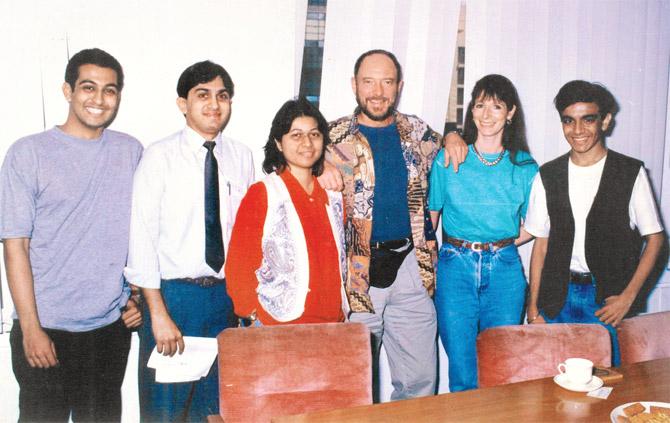
Media consultant and archivist Parag Kamani (in tie) with fans greeting Ian Anderson in Bombay in 1994. Anderson told Kamani that the Eagles had 'stolen' his song, We Used to Know, from Jethro Tull's second studio album... and called it Hotel California
But nothing prepared Kusnur for his scoop interview with a pair of legends. 'Every journalist has that one story to tell. This is mine,' he reported for mid-day. The piece, titled My one-night adventure with Led Zep, was pitched in a style as staccato-breathless as he doubtless felt in his heroes' presence. Tipped off by Kamani about Plant and Page landing on November 27, 1996 for Channel V Awards, Kusnur dashed to the airport... 'Suddenly saw this guy with long blonde hair. Robert Plant! Broke security cordon. I didn't care. Started shooting questions. Plant answered politely. Spoken voice a total contrast to the singing screech. Jimmy Page was there throughout. Hair cut short so didn't recognise him. He did an impromptu Stairway to Heaven on air guitar. Plant sang. Nobody knew them. A Mercedes was arranged. Page wanted an Ambassador.'
Page had driven an Ambassador on a 1972 trip when the duo sneaked into Slip Disc at Colaba. Putting up at the Taj, they ditched its disco for this "cooler joint" nearby. Murmurs about their arrival hit and hysteria raged. The beer-sipping rockers were mobbed by starry-eyed girls and boys who came clamouring for kisses and autographs. As with Kusnur, an avuncular influence shaped Bhatt's boyhood in Vile Parle — the brother of his Gujarati folk dancer mother. Dilip Purohit's penchant for picking records got his nephews, Pilak and his elder brother Gautam, scouring the streets for LPs from Rameshbhai and Razakbhai, vendors on the VT and Flora Fountain pavements.
Around the same time, a movie buff mother's weekly drill fired her eldest child's interest to document music. Sticking to the "First-day-first-show" motto, Susmita Kamani fetched her brood of four from school every Friday, with a change of clothes for each to quickly zip into en route. Their destination: the Eros-Excelsior-Regal cinema circuit for flicks like Hello Dolly. "Life was never the same after hearing Louis Armstrong," Kamani declares.
"In that pre-video era, we were mad about musicals like Singing in The Rain at American Centre." An early memory is the gift of a hand-cranked record player when he was three or four years old. "Relying on LPs from abroad, it was pure joy tearing open those shrink-wrapped packages." Most prized was the quadraphonic record of the 1960s band Chicago and multi-lingual Beatles editions — "I learnt to say 'I want to hold your hand' in German!"
Bhatt adds, "It was extremely difficult getting records of Black Sabbath, King Crimson, and Emerson, Lake and Palmer." The turning point was watching A Hard Day's Night at that wonderful old theatre New Talkies in Bandra. Hopelessly hooked, he began buying heaps of LPs for R35-50 each. After getting Dark Side of the Moon from a tiny local petrol pump kiosk, up next were The Ventures' Walk Don't Run, piles of Carlos Santana and RD Burman — "Dum maro dum was psychedelic nirvana." When he wasn't buying LPs from Rhythm House, Bhatt borrowed them from record libraries: Stan's at Colaba, Hillway at Kemp's Corner and Vibrations at Breach Candy. "They were our browsing havens. But the true jamming hub was Bandra, where Gazebo hosted Atomic Forest and artistes such as Hannibal Castro, Nandu Bhende and Leslie Godinho who was RD Burman's drummer."
Between them, the three men list some reigning sultans of swing post-1950 (in that year Bombay boomed with an incredible 65 bands). Superbly silk-toned talents bookended Churchgate's jazz joints, from Venice and Skyline at The Astoria till Talk of the Town on Marine Drive. Putting a smile on music lover lips were deliciously grunge gig spots like Bullock Cart, Slip Disc and Razzberry Rhinocerous — more affordable, of course, than Blow Up and The Cellar at the Taj and Oberoi. A vibrant local line-up included Kersi Lord, Chris Perry, Chic Chocolate, Braz Gonsalves, Uma Pocha, Usha Uthup, Ajit Singh, Devika and Suresh Bhojwani.
A 1980s wave of international acts wowing the city included The Police (welcomed with signs of 'Police: Not Cops but Pops'), Osibisa, Boney M, Uriah Heap, Wishbone Ash and Europe. That same decade's pop icons, Michael Jackson, Madonna and George Michael had a huge following and Grammy highlights telecast on Doordarshan pushed the video culture.
Speaking of "our" songs and Gen Next's, Bhatt hopes his son will soon outgrow electronic dance music. Kusnur says that though many youngsters are into EDM and thrash/death metal, he knows 14-year-olds who dig Jimi Hendrix and Crosby Stills Nash and Young. Kamani shares how his 10-year-old happily swaps current boy band idols for Bon Jovi and The Eagles, whose classics father and son often break into together. He believes Give It Up by KC and the Sunshine Boys worked well in the finale of the film Kingsman: The Secret Service.
I offer a story in return. My daughter and I were watching the end of Kung Fu Panda with her classmates. The credits rolled, with "expert timing" to strains of
Everybody Was Kung Fu Fighting. Thrilled with that smash pop blast from our past, some of us mums sang along, dancing down the Inox steps. Half a dozen mortified little girls stared. We discounted hissy whispers of "What are you doing" and "Stop it please." Glad to bop back to Oh-hoh-hoh-hoah days of rah-rah and roar.
Author-publisher Meher Marfatia writes fortnightly on everything that makes her love Mumbai and adore Bombay. You can reach her at mehermarfatia@gmail.com
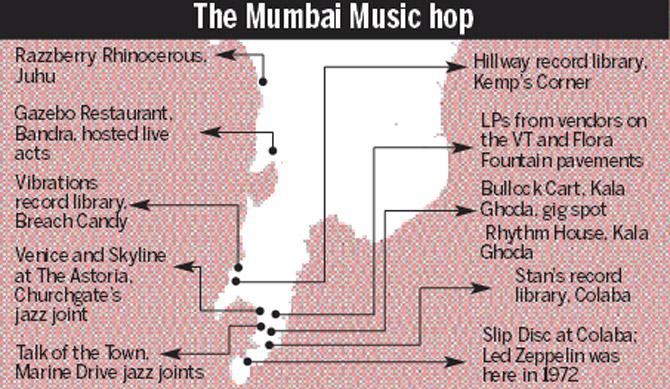
 Subscribe today by clicking the link and stay updated with the latest news!" Click here!
Subscribe today by clicking the link and stay updated with the latest news!" Click here!






